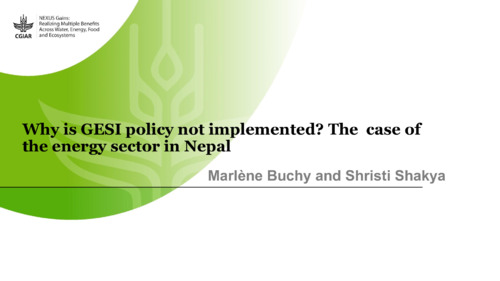Why is GESI policy not implemented? The case of the energy sector in Nepal
Abstract
Social norms are often put forward to explain resistance to gender equality and social inclusion (GESI) and women continue to be largely absent from decisionmaking positions in the energy sector worldwide. However, there is limited research on institutional mechanisms of policymaking and implementation at different scales within a federal system. Using Nepal as a case study, this paper explores why, despite commitments, progress toward GESI objectives in the energy sector has been slow. Based on a review of energy policies, and interviews at federal, provincial, and local government spheres, this paper focuses on the institutional and policy processes at play within the energy sector and between the three spheres of the federal system. It examines the extent to which these processes undermine inclusion. Understanding the broader institutional processes helps to identify different bottlenecks compromising progress in GESI: those which are linked to deficient policy regimes which cannot be addressed solely through additional GESI-focused interventions, and those which can be characterized as resistant to GESI-related issues. The aim of this research is also to understand why Nepal’s public energy institutions, despite a constitutional commitment to gender equality and nondiscrimination seem so reluctant to mainstream GESI within its policies and practice. The paper concludes that GESI implementation in the energy sector suffers from limited human resources, a narrow conceptual framing, and delays in policy development and implementation within different spheres of the federal system. Moreover, shortcomings related to GESI policymaking and implementation should be considered within the broader context of federalism.

